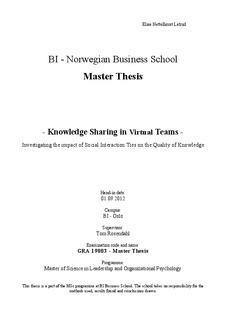| dc.description.abstract | Key Words: Virtual/Distributed Teams, Knowledge Sharing, Knowledge Quality, Social Network Theory, Social Interaction Ties Context of the Study: One unique aspect of virtual teams is that they can be comprised of expert members regardless of location. As a consequence, the use of these teams enables knowledge sharing to exceed boundaries of time and space. For this reason the ability to facilitate for the sharing of explicit-, but maybe more importantly, the sharing of tacit knowledge in virtual teams is crucial to organisations. Moreover, teams that develop mechanisms to share high-quality knowledge will be more likely to accomplish tasks effectively, perform better and reduce information overload. Purpose: Through close social interaction, individuals are able to increase the depth, breadth and efficiency of knowledge sharing. Hence, the relationships between actors in the social network indicate what kind of knowledge is being shared, between whom and to what extent. Moreover, developing network ties becomes even more crucial for members of virtual teams, because they have only limited opportunities to learn from observing others. Considerable research supports the notion that people obtain useful knowledge from others with whom they maintain strong ties, as strong ties aid the development of trust and reciprocity. However others again suggest that weak ties provide the most useful knowledge, as these ties provide access to non-redundant information. This discussion was yet to be found in the literature on networks in virtual teams. Consequently, the purpose of this study is to present an overview over selected theories, and enlightened by these theories investigate how the strength of social interaction ties between members in a virtual team affects the quality of work related knowledge shared in these ties. Social interaction ties are represented by strength of the relationships, the amount of time spent on interaction, interpersonal trust and communication frequency between the members in a virtual team. Whereas knowledge quality is defined as the extent to which the awareness and understanding of ideas, logics, relationships, and circumstances in a project are !t for use, easy to adapt, and relevant and valuable to the context. Methodology: A multiple case study involving four virtual teams was employed. The teams consisted of members from a vide variety of professionals, companies and countries. Social network analyses were used as a tool to portray the social interaction ties and the quality of knowledge within the virtual teams. Findings: Empirical evidence from this study shows that social interaction ties are multiplex, and that the perfect combination that will lead to the sharing of quality knowledge depends both on circumstances and the nature of the knowledge shared. Accordingly, some components of the social interaction ties have shown to influence the knowledge quality, whereas others show to have no extended effect. Altogether findings show that the strength of social interaction ties between members in a virtual team positively affect the quality of knowledge shared in these ties. The component of a social interaction tie that had the most impact on the quality of knowledge shared between members of a virtual team was Competence-based Trust ties. Secondly, Frequency of Communication ties and Longer Time spent on Interaction ties had an evident effect on the quality of knowledge. Furthermore, Benevolence-based Trust ties had some effect on the knowledge shared, whereas Close Relationship ties are shown to only have a small noticeable impact on the quality of knowledge shared between team members in a virtual team. Moreover empirical evidence shows that members of virtual teams that are connected by strong Social Interaction ties can be expected to share knowledge with higher quality, than team members that are connected by weak Social Interaction ties. Contribution: This study has attempted to contribute to the research field of both knowledge sharing in virtual teams and social interaction ties. Hence, the findings in this study should provide a potential for virtual teams to enhance the sharing of knowledge within the team. Moreover, previous research shows that many social network studies avoid the complexity of multiplex data by only focusing on a single relation, or by dealing with multiple relations separately. This study has attempted to contribute to the research of multiplexity in social interaction ties. Based on already established theory this study has interpreted social interaction ties in a virtual team as a sum of the close relationship, interpersonal trust, frequency of communication and time spent on interaction. | no_NO |
